Tamar St, near bridge
1829-1862
The best I can tell it was on the east side of Tamar Street, on or beside the Esplanade (now Boland St), which is shown below. The hotel on the corner is Tynan’s Hotel, constructed 1888.
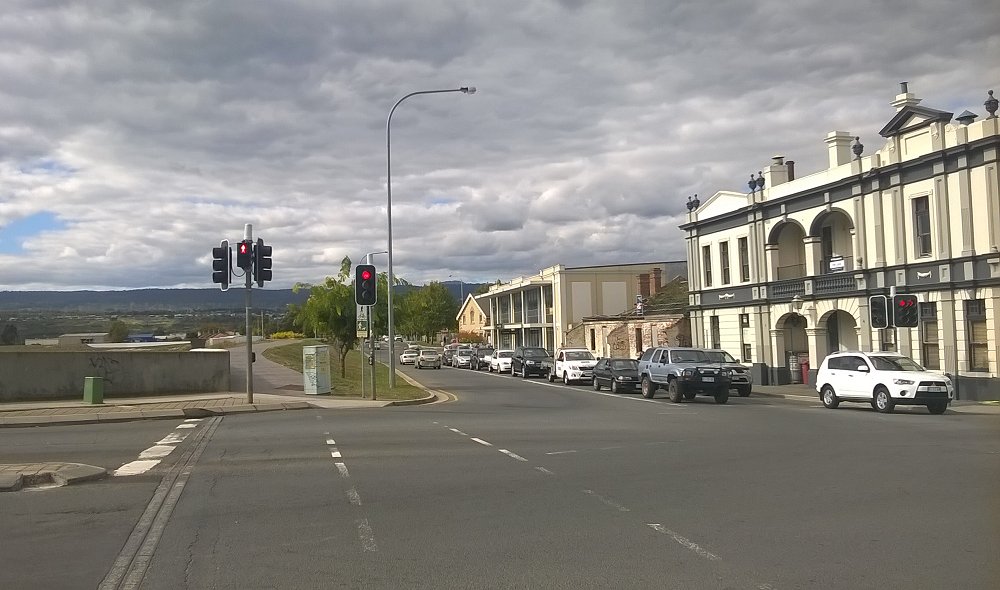
1829-30 John Daniels, Ferry house, Bridge Street
1834-8 John Daniels, Ferry House, Launceston
1840 John Cassidy, Ferry House
1840-41 John Cowtan, Ferry House, Tamar Street
1842-43 Samuel Storey, Ferry House, Tamar Street
1844 Robert Daniels, Ferry House, Tamar Street
1845 S. Tulloch, Ferry House, Tamar Street
1845 John Henry Cordell, Ferry House, Tamar Street
1848-50 Donald Westcombe, Ferry Houses, Tamar-street
1851-3 Robert Jones, Ferry House, Tamar street
1854-62 Frederick Jones, Ferry House, Tamar street.
From “A Tale Of The Tamar: a veteran pilot interviewed”:
Let us take our stand on the roadway between Tynan’s Hotel at the foot of Tamar-street, and the Tamar-street bridge; and look down the river. Behind us is the Ferryhouse Hotel, a rambling one-storeyed structure of shingles and weatherboards, kept by an old sea dog named Captain Daniels, who also keeps the ferry from which the house takes its name, and which is the only means of crossing to the northern bank, where there is nothing but the fringe of gums, wattle, and tea-tree which lines the bank of the river.
Launceston Examiner, 10 December 1892
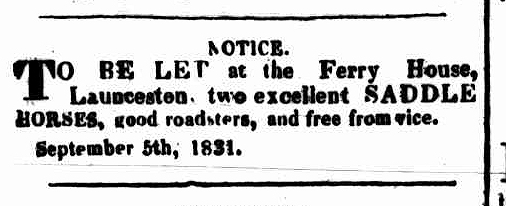
Launceston Advertiser, 12 September 1831
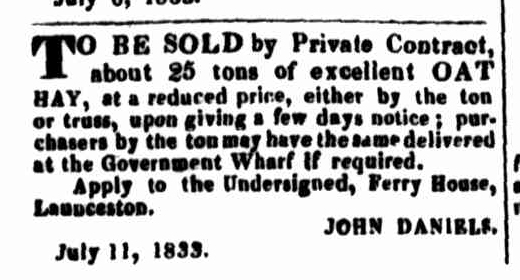
Launceston Advertiser, 11 July 1833
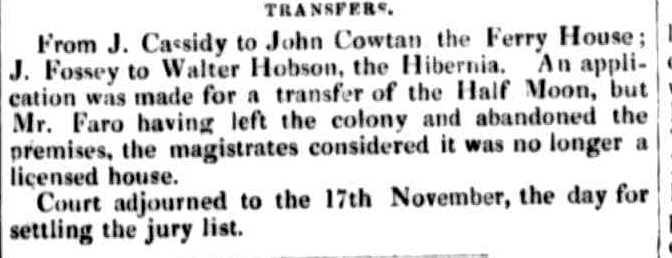
Launceston Advertiser, 5 November 1840
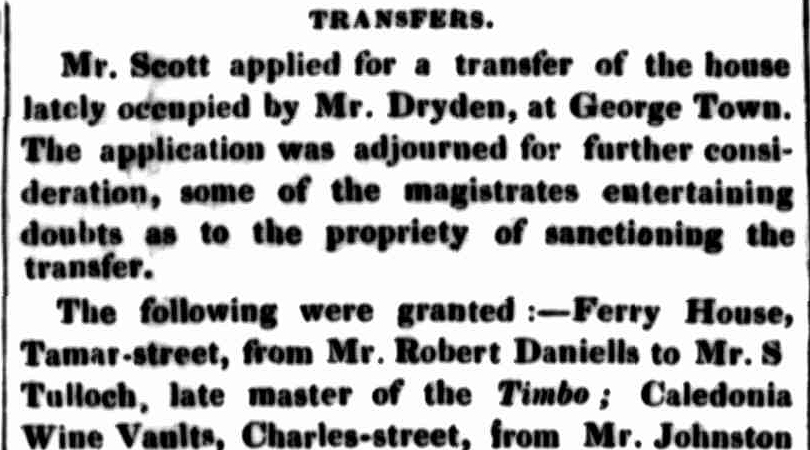
Launceston Examiner, 7 May 1844
From “Annual Licensing Meeting”:
John Henry Cordell, Ferry House, Tamar-street.- One conviction.
Capts. Friend and Neilly spoke in favor of Mr. Cordell ; Capt. Gardiner, also, said he had more frequently occasion to hold inquests in his house than in any other in Launceston, and a better conducted house could not exist.— Granted nem. con
Cornwall Chronicle, 2 September 1846
From “Annual Licensing Meeting”:
Joseph Cordell, “Ferry House,” Bridge: no convictions; conduct good; premises indifferent, owing to the dampness, but as neat and clean as could be expected: the day before the Police Magistrate visited the house, the river had taken possession of the parlour. Granted.
Launceston Examiner, 4 September 1847
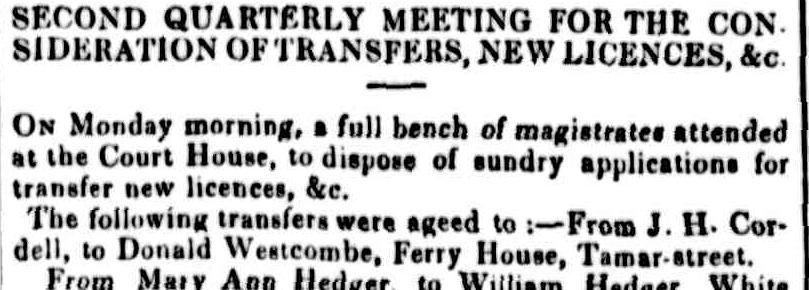
Cornwall Chronicle, 9 February 1848

Launceston Examiner, 25 December 1850

Cornwall Chronicle, 5 February 1851
LAUNCESTON.
On Tuesday morning the floods rose to such a height as to completely submerge the Tamar bridge and the swamp ; and some of the residents at the end of Tamar and William streets were obliged to desert their dwellings, and leave their household furniture, and other buoyant articles literally floating about their domiciles. Mr. Jones, of the Ferry-house, was washed out, the water having risen level with the top of his bar-counter ; Mr. Fawns, brewer, had a large quantity of sugar destroyed. Mr. Ackerman, who resides on the esplanade, lost an immense quantity of billet and other wood, and was compelled to procure a boat to land his wife in a place of safety. Messrs. Button and Waddell’s jetty is quite destroyed…. The river Tamar presented a scene more easily conceived than described ; fragments of bridges, casks and rubbish of all descriptions, were floating in all directions. [continued[
Colonial Times, 13 August 1852
From “Transfer of Licenses”:
The transfer of the license for the Ferry House, near the Bridge, was granted from Robert Jones to Frederick Jones, his uncle.
Cornwall Chronicle, 9 August 1854
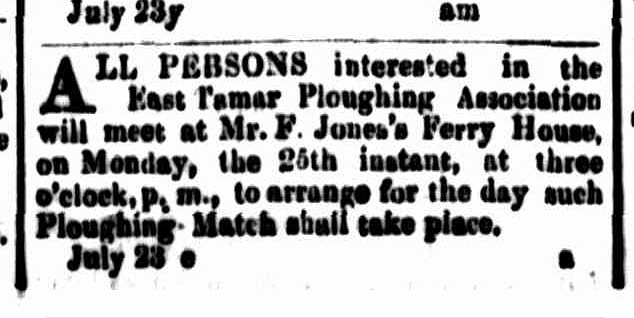
Cornwall Chronicle, 23 July 1859

“Launceston Examiner, 4 December 1860
From “Annual Licensing Day”:
Frederick Jones, Ferry House, Tamar street.
The Police Magistrate said that the house was under water at times, the floors had given way, and the place was tumbling down–in fact, it was only owing to the care exercised by the tenant that the place had not tumbled down before now. Mr. Jones had kept the house as well as it could be kept.
Mr. Douglas said that the property belonged to a minor, who had promised that when he came of age, namely, in July next, he would enter into arrangements with Mr. Jones for making improvements. – -. Mr. Jones, in answer to a question from the Chairman, said that he would throw up the license if the owner, when he became of age, did not let him build better premises.
License granted for this year only.
Launceston Examiner, 10 December 1861
From “Quarterly Licensing Meeting”
TRANSFERS
The Clerk of the Peace said that the first business was the consideration of the transfer of the Victoria Hotel, Brisbane and George streets. There were two separate applications. One for a transfer to David Harris, and the other to Frederick Jones.
Mr. Alfred Green appeared to support Mr. Harris’. application. Mr. Douglas said he appeared for Mr. King and Mr. Jones. The former had withdrawn his agreement to transfer the house to Mr. Harris, as he had not carried out an arrangement proposed by him.
Mr. Green urged that the transfer should be granted to Mr: Harris, as he had already paid King some consideration for it. Mr. Robertson said that if this wore the case, it looked like a piece of very disgraceful jobbery on the part of Mr. King. Mr. Douglas said the money had never been paid over to King, but had merely been deposited with a third party. The Chairman said that the magistrates in the discharge of their public duty could not take all these private transactions into consideration.’ The Court could not consent to any transfer, unless both parties were agreed.
Mr. Green pointed out that Mr. Jones’ application had not been filed fourteen days previous to the licensing meeting, in accordance with the Act. Mr. Douglas said that it was only one day short of the time, and that was on account of applicant being unable to put it in on Easter Monday, it being a public holiday. Besides, the 25th clause of the Act gave power to amend any inaccuracies in the application. If this clause did not give the justices power to overrule Mr. Green’s objection in word, it did at least in spirit. Mr. Dowling said that he had seen very serious and dangerous precedents formed by acting on what was termed the spirit of the law. He thought the clause quoted by Mr. Douglas only gave power to amend any insufficiencies in the document delivered to the Court. At the same time the fact of the day before the application being a holiday might induce the justices to strain a point in favor of Mr. Jones. He would like to know if the Chairman ruled that the application could be entertained when it had been filed a day after the time prescribed by the Act. The Chairman said he thought that it was in the discretion of the Court to do so. He would, however, put the question to the magistrates, and let it be decided by the major. ity of votes. The majority were of opinion that the Court could use this discretion.
Mr. Douglas said that the old license for the ,”Ferry House,” .Tamar-street, would be abandoned if this transfer were granted. Mr. Jones’ application was then-granted.
The next application was for the transfer of the “Ferry House Hotel,” Tamar-street, from Frederick Jones to John Ernest King.
The Police Magistrate considered it his duty to oppose this transfer. . The magistrates were all aware of the description of the house, and that but for the care used by Mr. Jones in keeping it in repair, a license would have been refused at the last annual meeting. He also objected to the applicant. He did not wish to bring up events of the past and would therefore merely state that applicant was a very young man, and not competent to take charge of a public house.. Besides, there was always an objection to granting licenses to young unmarried men, and looking at all circumstances, he thought this was a very good opportunity of closing the old house, which had been condemned over and over again.
Mr. Douglas said he appeared for applicant, whose father had got into pecuniary difficulties -in fact, was now confined in gaol for debt. Were the transfer granted, the house would be managed by the mother in the domestic concerns. Mrs. King was unable to make the application herself, her husband being alive, and therefore in order to obtain a business which would yield support to the family, the application was made in the name of the son. The application was unanimously refused.
Launceston Examiner, 6 May 1862
From “General Sessions”:
Transfer of License to the Ferry House Inn.
Mr. Rocher made a strong appeal on behalf of granting the transfer of the Licence to the Tamar House Inn to John Ernest King, as a means of support for his mother and family to the end of the year, by which time appellant father would probably be again in a position to support them.
The appeal was disallowed.
Cornwall Chronicle, 21 May 1862
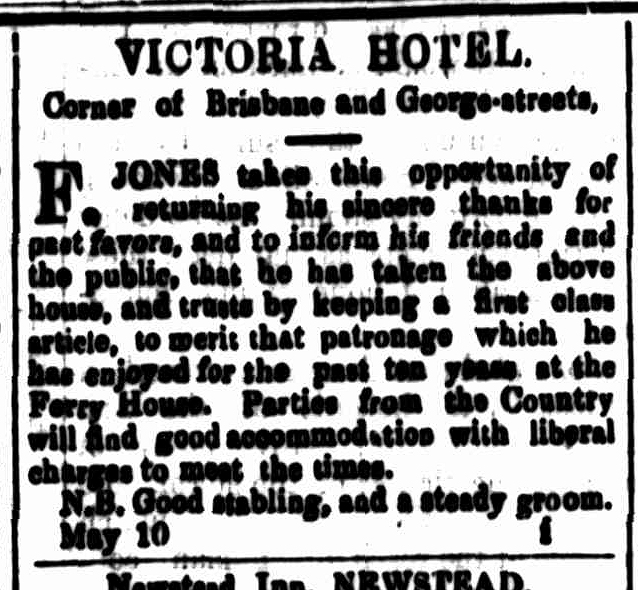
Cornwall Chronicle, 31 May 1862
MR. SCOTT’S premises at the Tamar Bridge–the old Ferry House Tavern–seems to have been filled with water, all the rooms are on the ground floor several feet below the level of the street. He had no time to remove his goods after the flood began to rise, and much of those in his grocery and drapery shop have been severely damaged. All his beds, bedding, and furniture have been injured and his loss cannot be much under £100
Cornwall Chronicle, 19 December 1863
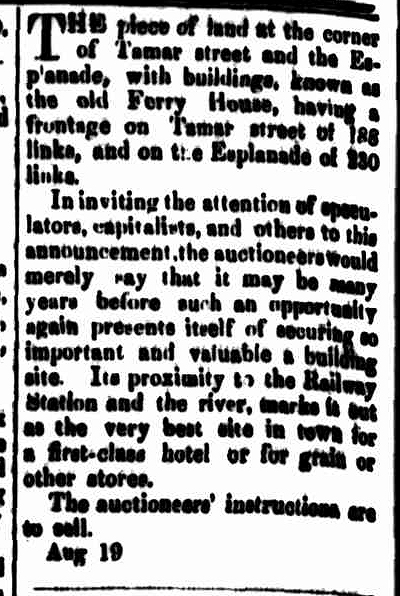
Cornwall Chronicle, 19 August 1868
What a wonderful website! There is a wealth of information here. I was wondering if you would like to include the following newspaper item published in the Cornwall Chronicle, 9 August 1854:
“The transfer of the license for the Ferry House, near the Bridge, was granted from Robert Jones to Frederick Jones, his uncle.”
This has particular significance as it draws a link between Robert’s father, Britton Jones, and Frederick Jones: that is they were brothers. From this information it has been possible to establish their parents to be Elizabeth Webb and William Jones. Previously it was thought that Britton Jones’s parents were Mary Webb and Britton Jones though many researchers have been unable to find evidence of this. There are baptismal records for both Britton and Frederick with Elizabeth and William as their parents.
Always happy to add bits, but sometimes it takes me a while to get it done.